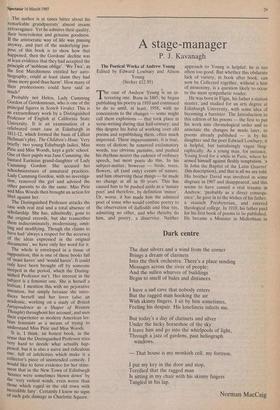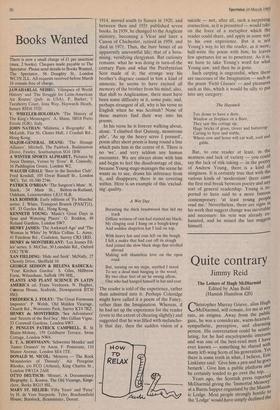A stage-manager
P. J. Kavanagh The Poetical Works of Andrew Young Edited by Edward Lowbury and Alison Young (Secker £12.95) The case of Andrew Young is an in- teresting one. Born in 1885, he began publishing his poetry in 1910 and continued to do so until, at least, 1958, with no concessions to the changes — some might call them explosions — that took place in verse-writing during that half-century; and this despite his habit of working over old poems and republishing them, often much improved. These improvements, it is true, were of diction; he removed exclamatory words, too obvious pietisms, and pushed his rhythms nearer the cadence of ordinary speech, but most poets do this. In his subject-matter, however — birds, trees, flowers, all (and only) events of nature, and him observing these things — he made no change at all in 50 years. This has caused him to be pushed aside■ as a 'nature poet' and therefore, by definition 'minor'. Or, worse, it has made him the admired poet of some who would confine poetry to the observation of daffodils and blue tits, admitting no other, and who thereby do him, and poetry, a disservice. Neither
approach to Young is helpful; he is too often too good. But whether this obdurate lack of variety, in book after book, can now be Collected together, without a hint of monotony, is a question likely to occur to the most sympathetic reader.
He was born in Elgin, his father a station master, and studied for an arts degree at Edinburgh University, with some idea of becoming a barrister. The Introduction to this edition of his poems — the first to put his work into chronological order and to annotate the changes he made later, to poems already published — is by his daughter and the poet Edward Lowbury; it is helpful, but tantalisingly vague biog- raphically. As a young man, for instance, Young lived for a while in Paris, where he armed himself against fleshly temptation, 'a St John the Baptist of the Latin Quarter' (his description), and that is all we are told. His brother David was involved in some disgrace in 1907 and disappeared, and this seems to have caused a real trauma in Andrew; 'probably as a direct consequ- ence', he gave in to the wishes of his father, a staunch Presbyterian, and entered theological college. In 1910, his father paid for his first book of poems to be published. He became a Minister in Midlothian in 1914, moved south to Sussex in 1920, and between then and 1931 published seven books. In 1939, he changed to the Anglican ministry, becoming a Vicar and later a Canon of Chichester, retired in 1959, and died in 1971. Thus, the bare bones of an apparently uneventful life; that of a bota- nising, versifying clergyman. But curiosity remains: what he was doing in turn-of-the century Paris and what the Presbyterian Scot made of it; the strange way his brother's disgrace caused in him a kind of amnesia; he seems to have excised all memory of the brother from his mind; also, that shift to Anglicanism, there must have been some difficulty in it, some pain; and, perhaps strangest of all, why is his verse so English when he was Scottish? None of these matters find their way into his poems.
In his verse he is forever walking about, alone. 'I climbed that Quinaig, monstrous pile', 'As up the heavy scree I pressed', poem after short poem is hung round a line which puts him in the centre of it. There is no 'we', and very seldom any human encounter. We are always alone with him and begin to feel the disadvantage of this, because Young stage-manages the scene he wants us to see, draws his inference from it, and disappears; there is no covering within. Here is an example of this 'exclud- ing' quality.
A Wet Day Breasting the thick brushwood that hid my track Diffuse wetness of rain had stained me black; My clinging coat I hung on a bough-knop And sodden shapeless hat I laid on top.
With heavy hat and coat left on the bough I felt a snake that had cast off its slough And joined the slow black slugs that strolled abroad Making soft shameless love on the open road.
But, turning on my steps, startled I stood To see a dead man hanging in the wood; By two clear feet of air he swung afloat, One who had hanged himself in hat and coat.
The reader is told of the experience, rather than admitted into it. Perhaps Coleridge might have called it a poem of the Fancy, rather than the Imagination. Whereas, if he had set up the experience for the reader (even to the extent of cheating slightly) and suggested that he was filled with melancho- ly that day, then the sudden vision of a suicide — not, after all, such a surprising connection, as it is presented — would take on the force of a metaphor which the reader could share, and apply in some way to his own experience. But it is not Young's way to let the reader, as it were, half-write the poem with him; he leaves few apertures for us to penetrate. As it is, we have to take Young's word for what Young saw, and then he is gone. Such carping is ungrateful, when there are successes of the Imagination — such as the poem 'Field Glasses' — and pleasures such as this, which it would be silly to put into any category:
The Haystack Too dense to have a door, Window or fireplace or a floor, They saw this cottage up, Huge bricks of grass, clover and buttercup Carting to byre and stable, Where cow and horse will eat wall, roof and gable.
But, to one reader at least, in the neatness and lack of variety — you could say the lack of risk-taking — in the poetrY of Andrew Young, there is a kind of stinginess. It is certainly true that with the various kinds of 'modernism' there came the first real break between poetry and any sort of general readership: Young is re- ported to have said to a more famous contemporary: 'at least young people read me.' Nevertheless, there are signs in his work that suggest change was inevitable and necessary: his vein was already ex- hausted, and he mined the last nuggets himself.



















































 Previous page
Previous page